More languages
More actions
Brainwashing is an orientalist term invented by the CIA to discredit dissident soldiers during the United States' invasion of Korea in 1950. Soldiers that defected to the People's Liberation Army or Korean People's Army were alleged to have been converted against their will to sympathise with the enemy and even fight for them. This term clearly underlines that their new beliefs were not their own and instead had let themselves be synthetically influenced. This practice, completely invented out of thin air, served a dual purpose: it kept support for the war high at home by painting the defectors as "bad apples", and discouraged further defections.
In actuality, soldiers that defected from the United States to either Chinese or Korean forces had their reasons for doing so, the main one being that they did not see the point of fighting a war for bourgeois interests so far from home. At the time, the United States practiced segregation and some of those soldiers found more in common with their captors than with their supposed homeland.
History

Journalist Edward Hunter was the first to use the term brainwashing in the media. His September 1950 article in the Miami Daily News, Brain-washing Tactics Force Chinese Into Ranks of Communist Party, made up the term xi nao (literally "wash brain" in Chinese) to explain why the Communist Party of China enjoyed popular support and was present in Korea. He was also the first to propose the idea that it was possible to "reprogram" someone so fundamentally that they would believe anything.
The time and place the word was created in was of course not insignificant, and Hunter's story helped propagate yellow peril anticommunist narratives about China. Brainwashing was a secret practice, using ancient techniques that only the mystical Chinese people had access to -- not like the Americans, who are free to believe what they want and always make the right decisions willingly. Hunter was later revealed to be a CIA agent, and his article was but one in a long list of regime change attempts supported by the bourgeois media, but the damage had already been done.
By then, the United States had already invaded the Democratic People's Republic of Korea so as to protect their puppet state in the south, the Republic of Korea. As the war went on and soldiers were captured, many defied beliefs in the United States by taking a stance against the war. 5000 of the 7200 prisoners of war captured by the DPRK and their allies petitioned the United States government to end the war. 21 soldiers refused repatriation after the war and stayed in the DPRK, with some of them appearing in movies. This dissidence from within their own ranks shook the Statesian public as well as fellow soldiers, and thus brainwashing was brought in mainstream discourse to explain how they could have become "corrupted" by communism. The media would discredit them as having low IQs, being alcoholics, or having STDs to explain how they could be brainwashed into supporting communism. These unabashed attacks would also serve the purpose of keeping war support high by attacking anyone who would dare not follow the State Department's line. Two of the nonrepatriates went back to the United States during the 90-day armistice talks, and were promptly court martialed and sentenced to 5 and 10 years in prison.
The United States also propagated the idea that these soldiers were tortured so severely that they simply confessed to anything their captors demanded, but these accusations are denied by the PLA and KPA who assert they have never used torture methods on prisoners of war.
In reality, the United States was again accusing an enemy of doing what they themselves would do. In 1953, the same year the armistice between the DPRK and its occupied neighbour was signed, the CIA started project MK Ultra, which culminated in many unethical and illegal experiments.
